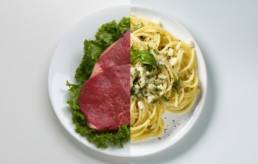Carbohydrates vs Protein
How many times a year do we all try and cut out carbs? And how many times do we fail? Why?
Here we are going to look a little bit closer. If you want to know how our bodies react to carbs and why carbs can lead to weight gain the please read on…if you know the actual reasons why you should lower or cut your carbs then this blog may inspire you to maintain a more balanced diet.
Lets look at our current diet, how much of what you have consumed today would be classed as a carbohydrate? More than likely the majority of it. Carbohydrates can be anything from a pizza, a sandwich to a chocolate bar.
How our bodies react to this is important. Our bodies break down carbohydrates into glucose, this is then absorbed into cells with the help of a hormone called insulin. Once the energy has been transported into our cells 2 main actions happen, we will either use the glucose from carbohydrates as energy or store it as fat to be used later when needed. This is where the problem lies! Because we eat a high carbohydrate diet on a daily basis, and live fairly inactive lives at least Monday to Friday whilst at work, we keep on storing more and more fat.
‘Elevating insulin levels drives us to store more fat’
Lets look at a few of the many benefits protein has! Protein first and foremost reduces hunger. You will feel fuller and for longer. Carbohydrates unsurprisingly have the opposite effect. So you can therefore eat more of it, feel more satisfied and eat fewer calories. Another amazing benefit of protein, we expend more energy digesting it! Protein actually requires nearly two times the calories to breakdown as carbs. The most commonly known benefit of protein is the effect it has on muscles and promoting muscle growth. Both strength training and consuming protein will aid in muscle growth when done separately. Pair the two together and you will have a far more superior rate of muscle growth as they are synergistic. Additional benefits include better bone density, improved brain function, lower blood pressure, stronger tendons and will aid better recovery from injury.
What should you do next? Small incremental changes is often the best way to go about improving your nutrition. For a diet that will aid in fat loss you want to stay away from refined Carbs; Pizzas, Bread, Pasta, Rice, Chocolate, Fizzy Drinks. If you want to get specific, I would first and foremost eliminate wheat. Wheat has the same effect on blood sugar as plain table sugar. Secondly, choose where you get your carbs from? Natural sources such as Quinoa, Sweet Potato rather than refined processed as for obvious reasons are a lot better. Lastly, Fibre! Fibre is your friend. Your main source of fibre should ideally come from fibrous vegetables, which are also very low in carbohydrates. Another benefit is the effect it will have on your insulin, you won’t get as big a sugar spike making them an ideal fat loss food.
What should your meals look like? In an ideal world each of your main meals would include a protein source, a fat source, and a green vegetable. If you can stick to this as a rule of thumb you are heading in the right direction for a more nutritious diet that will promote fat loss and ultimately provide you with more energy.
